

Can a “Like” Save a Life? A Georgetown University and Waggener Edstrom study sheds new light on the debate surrounding the effectiveness of online influence.
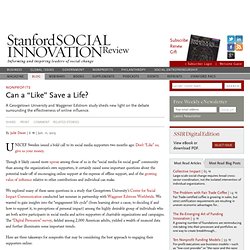
UNICEF Sweden issued a bold call to its social media supporters two months ago: Don’t “Like” us; give us your money. Though it likely caused more uproar among those of us in the “social media for social good” community than among the organization’s own supporters, it certainly raised some important questions about the potential trade-off of encouraging online support at the expense of offline support, and of the growing value of influence relative to other contributions and individual can make.
We explored many of these same questions in a study that Georgetown University’s Center for Social Impact Communication conducted last summer in partnership with Waggener Edstrom Worldwide. Here are three takeaways for nonprofits that may be considering the best approach to engaging their supporters online: It’s all about influence. Poverty & Social media. Why Social Media is the Answer to Ending Poverty. Home » EWB 2011 » Student Presentations » 140 Characters or less: Why Social Media is the Answer to Ending Poverty Abstract Today we live in a world where six degrees of separation has scarily become one or two degrees.
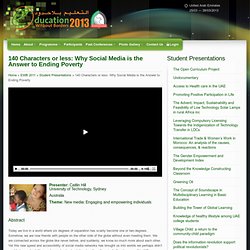
Somehow, we are now friends with people on the other side of the globe without even meeting them. We are connected across the globe like never before, and suddenly, we know so much more about each other. Yet this new speed and accessibility of social media networks has brought us into worlds we perhaps didn’t want to know about. Now these global issues are more accessible to us, what should be our response?
I’ll be drawing on my own experiences of raising $1300 for an NGO in a week thanks to an online campaign. Poverty and social media: the right weapon for the fight? Number of views : 3553 Rating: 5.0/5 (1 vote cast) Last October, Malcolm Gladwell wrote an article for the New Yorker stating in no uncertain terms that social media could not change the world.

He argued that while Facebook and Twitter might be powerful ways of spreading quick information to a whole lot of (initiated) people, when it came to fighting injustice and effecting real change on an issue, the internet was never going to be the almighty weapon, the great demos, that people spoke about. “Arm-chair activism” might make us feel like we are taking a stand, but it wouldn’t get people out on the streets, it wouldn’t oust a leader, and it wouldn’t feed the world. Given the events that we have seen this year, has Gladwell been proved wrong? Social Media & the Next Global Development Agenda.
Social media has changed the landscape of fighting poverty, creating policy, and changing the world.
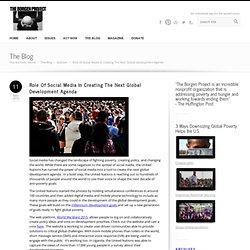
$1.50 Challenge: #SocialMedia Raises Awareness of Poverty. This year, 20,000 people are expected to participate in the $1.50-a-day living challenge, in support of the 1.2 billion people who have no choice but to take that challenge every day.
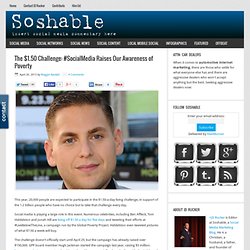
Social media is playing a large role in this event. Numerous celebrities, including Ben Affleck, Tom Hiddelston and Jonah Hill are living off $1.50 a day for five days and tweeting their efforts at #LiveBelowTheLine, a campaign run by the Global Poverty Project. Hiddelston even tweeted pictures of what $7.50 a week will buy. The challenge doesn’t officially start until April 29, but the campaign has already raised over $150,000.
GPP board member Hugh Jackman started the campaign last year, raising $3 million. The Internet and social media are creating a web of interconnectedness that allows disparate memes to butt heads in ways that weren’t possible before. Unfortunately, hiding problems and refusing to ask for help rarely makes them go away. REPORT: DIGITAL PERSUASION. ICT & Development. Is social media the cure to poverty porn? This Pulitzer Prize winning photo by Kevin Carter during the ’94 Somalia famine is poverty porn, say some critics.
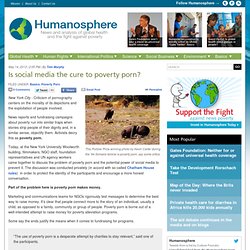
New York City - Criticism of pornography centers on the morality of its depictions and the exploitation of people involved. News reports and fundraising campaigns about poverty run into similar traps when stories strip people of their dignity and, in a similar sense, objectify them. Activists decry this as poverty porn. Today, at the New York University Woolworth building, filmmakers, NGO staff, foundation representatives and UN agency workers came together to discuss the problem of poverty porn and the potential power of social media to prevent it.
The discussion was conducted privately (in accord with so-called Chatham House rules) in order to protect the identity of the participants and encourage a more honest conversation. Part of the problem here is poverty porn makes money. Some say the ends justify the means when it comes to fundraising for programs. Communicating Complexity. Dóchas social media policy. Code of Conduct on social media.